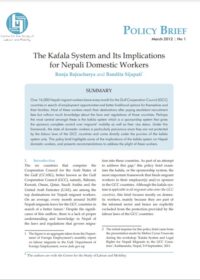Publications
The Kafala System and Its Implications for Nepali Domestic Workers
Over 16,000 Nepali migrant workers leave every month for the Gulf Cooperation Council (GCC) countries in search of employment opportunities and better livelihood options for themselves and their families. Most of these workers reach their destinations after paying exorbitant recruitment fees but without much knowledge about the laws and regulations of those countries.
Perhaps the most central amongst these is the kafala system which is a sponsorship system that gives the sponsors complete control over migrants’ mobility as well as their visa status. Under this framework, the state of domestic workers is particularly precarious since they are not protected by the labour laws of the GCC countries and come directly under the purview of the kafala system only.
This policy brief highlights some of the implications of the kafala system on Nepali domestic workers, and presents recommendations to address the plight of these workers.

